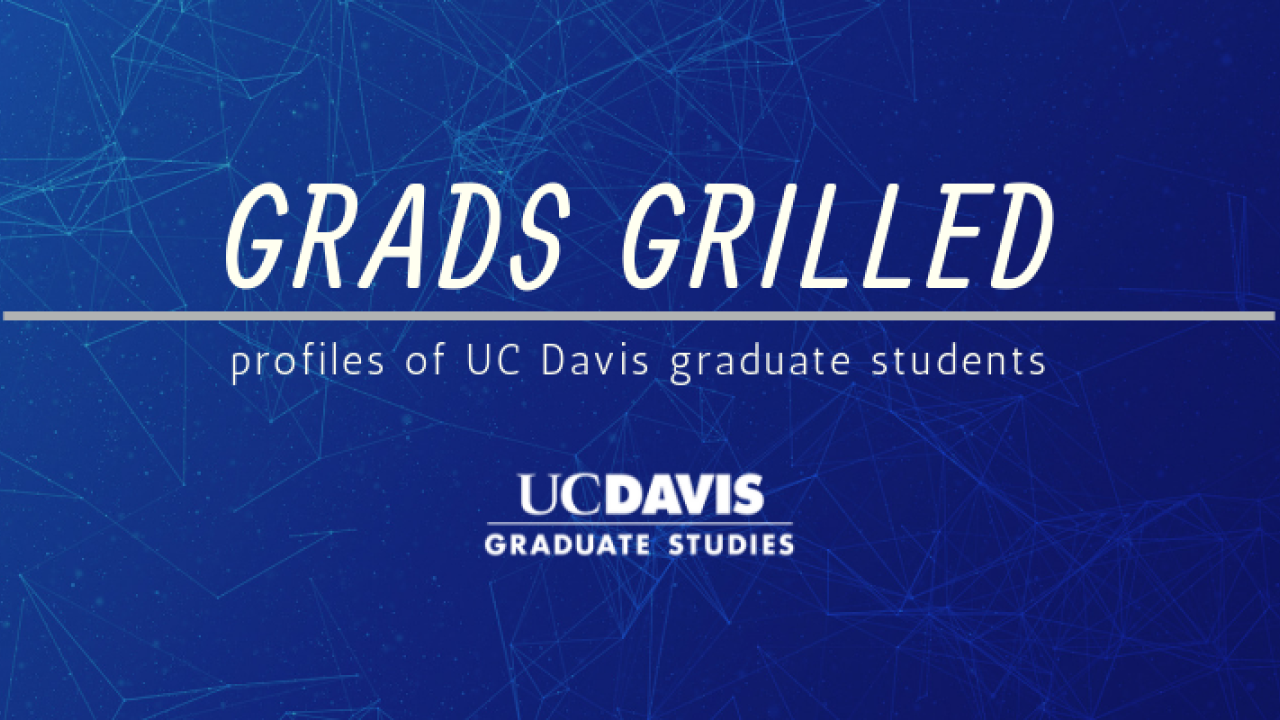
Graduate Student Profile: Dustin Mabry, Sociology
Meet UC Davis Graduate Student Dustin Mabry
- Department
Sociology
- Program and year of study
PhD, Second Year
- Previous degrees and colleges
MA Sociology, Humboldt State University
- Where did you grow up?
I grew up in both Bakersfield, CA and in a small town near New Orleans with the name Abita Springs. Two places with bit of twang.
- Where do you live now?
Davis, CA. However, soon to move back to Oakland where I lived prior to Davis for five years.
- What's your favorite spot in Davis?
Third Space Art Collective.
- How do you relax?
Paint, dance, exercise, protest, and ramen. All followed by froyo.
- What was the last book you read for pleasure?
Read through the eight books in Isaac Asimov’s Foundation Series. Typically I’m reading big Russian novels from folks like Tolstoy, but REALLY digging science fiction these days.
- What was the last film you saw at the theater?
The Love Witch on 35mm, at The Roxie in San Francisco’s Mission District.
- Research interests
I’m interested in the historical formation of “The Artist” in U.S. society, roughly between WWI and the dawn of the space age, 1957. In light of concerns surrounding a newfound potential for science to annihilate humanity, I see machine-age artists as promoting the promise of progress at home through industrial projects whereas later artists saw this potential in a new arena of Space exploration. I’m taking a 1952 symposium through Collier’s magazine to understand artists operating more like scientists in a politics of engagement: Pumping life into the machine under the great fear of a new wasteland in the making.
- Dissertation title or topic
The New Divinity: Space Artists in the Modern Wasteland
- Please share a surprising or noteworthy fact or finding from your research
The C.I.A. funded abstract expressionism while an ex-Nazi had drinks with artists to imagine nuclear missiles on the moon.
- Which professor or class inspired you to pursue graduate studies?
Although I probably didn’t know this until later, I was initially inspired by my punk rock community. I was really excited by my first course in philosophy, but generally knew that teaching at the college level was The Jam once I found myself in a community college.
- Which scholarly text do you wish you had written? Why?
To be obvious: Michele Foucault’s History of Sexuality, Vol. 1: An Introduction. Why? Because if I had written this book, I had thought about the world through Foucault’s approach and imagination. I find his treatment of the relationship between knowledge and power guiding my thoughts all of the time, even as I’m not a “Foucauldian” per se.
- What's the best thing about being a grad student?
The support from an enormous institution, which (most importantly) includes time from amazing scholars to help me think. There’s no way I could be pushing myself and my ideas without these folks and their attention. And things like health care. I was an adjunct community college instructor before this: no time to read or write, and no health care.
- What's the worst?
The enormous institution with its particular histor(ies). As much as I’m excited about becoming a “sociologist,” everyone I really admire (including some great sociologists) knows well that great things don’t come from following pre-conceived paths
- If you weren't a grad student, what would you be doing?
Teaching, for sure. I once worked in an adult school which was so inspiring.
- Finally, please ask yourself a question - "Why do you think institutions such as UC Davis hold (if they can “hold”) onto the promise of techno-scientific progress in light of what seems to happen in the world?"
I don’t know.
Graduate student profile courtesy of the UC Davis College of Letters and Science.
About Graduate Studies
Graduate Studies at UC Davis includes over 100 dynamic degree programs and a diverse and interactive student body from around the world. Known for our state-of-the-art research facilities, productive laboratories and progressive spirit – UC Davis offers collaborative and interdisciplinary curricula through graduate groups and designated emphasis options, bringing students and faculty of different academic disciplines together to address real-world challenges.
UC Davis graduate students and postdoctoral scholars become leaders in their fields: researchers, teachers, politicians, mentors and entrepreneurs. They go on to guide, define and impact change within our global community.
For information on Graduate Studies’ current strategic initiatives, visit the Graduate Studies strategic plan page.
